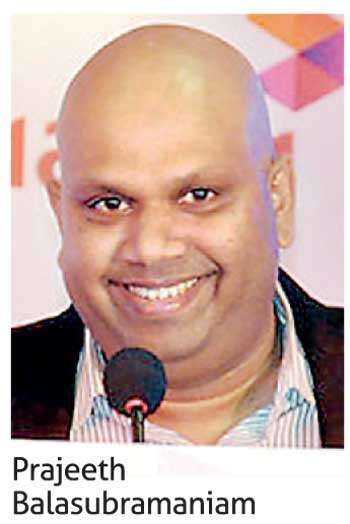04 Apr 2018 - {{hitsCtrl.values.hits}}
 By Chandeepa Wettasinghe
By Chandeepa Wettasinghe
The Sri Lankan government is finally taking requests of the start-up community to create a start-up ecosystem seriously following the involvement of the World Bank in authoring a white paper, according to a venture capitalist (VC).
BOV Capital Managing Director/General Partner Prajeeth Balasubramaniam, speaking at the launch of the US$ 15 million Digital Innovation Fund last week, said that the start-up community has been lobbying the government to create a start-up ecosystem for the past two years, but a response only came after World Bank involvement.
“There’s a World Bank team from the U.S. working on this with us, so they (the government) are taking us more seriously than before,” he said.
The white paper, which got input from the World Bank as well as the Development Strategies and International Trade Ministry, has been forwarded to the Finance Ministry.
“The paper has gone to the Finance Ministry and they’ve written back to us saying that they’re looking at it,” Balasubramaniam said. He said that the white paper lists 10 requirements, of which three proposals are absolutely critical towards establishing a robust start-up ecosystem.
“One is, right now you can only create as a private limited, limited liability or public quoted company, but for venture capital to exist globally, you should have a limited liability partnership structure, so that double or triple taxation doesn’t take place,” he said.
He said since start-ups have just a 10 percent chance of becoming disruptive, under the current conditions in Sri Lanka, VCs have to pay taxes for all the failed start-ups as well, which would eat into the profits the VCs make from the one start-up that succeeds.
“There’s no reason for any overseas VCs to come to Sri Lanka because they can’t create that kind structure, so that the top of the list for us,” Balasubramaniam said.
Secondly, he said that the government should make the process of closing down a business easier, at least for start ups.
“In Sri Lanka today, if any of these start-ups fail, I’ll be liable to pay all of these debts. If I don’t pay off then I will have to go to court and I can’t perform with all the other companies. So the government should create strict guidelines for these companies; no borrowing. If you fail it fails, it’s our money, and it’s done,” he said.
However, in today’s financial world, if the start-up wants to import any items, it would have to open letters of credit, which opens start-ups to debt liabilities, for which alternatives are required, according to Balasubramaniam.
Thirdly, he added that the current foreign exchange laws are too restrictive for start-ups to operate in.
“Relax foreign exchange laws. We have tried to move some of our start ups to Singapore to get regional exposure. The share swap doesn’t happen easily due to exchange control regulations, so we have asked the government to ease them,” he said.
The other seven requests include items such as calling on the government to set up a payment platform, to create a conducive environment for start ups in rural areas, and to accelerate the setting up of incubators.
“But without those main three, the others are irrelevant,” Balasubramaniam said.
He was however unsure on how long the government would take to facilitate the requests of the start-ups.
“It’s in the making but I don’t know when, in 6 months or one year,” he said.
18 Nov 2024 6 hours ago
18 Nov 2024 7 hours ago
18 Nov 2024 7 hours ago
18 Nov 2024 8 hours ago
18 Nov 2024 18 Nov 2024